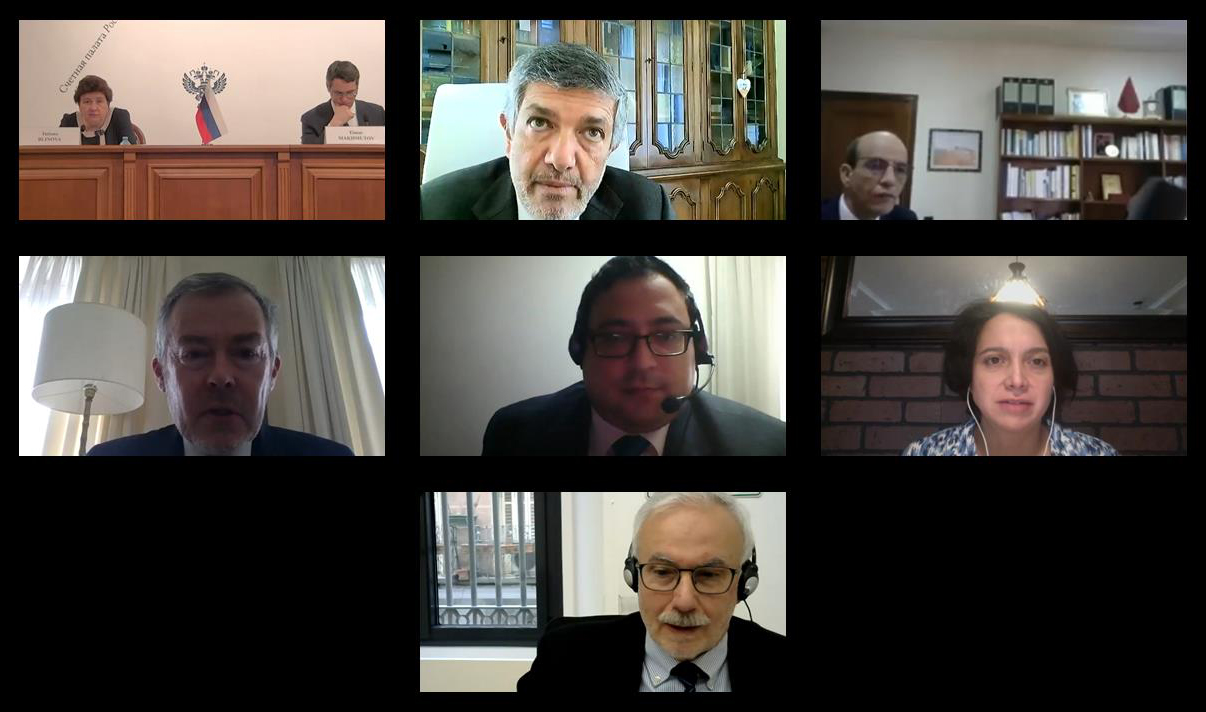
Effective agreements vs legislative procedures: second ACRF meeting of jurisdictional SAIs
During the seminar on May, 13 representatives of SAIs from Chile, France, Italy, Morocco, Peru, Russia and Spain discussed pros and cons of jurisdictional functions in auditing and made plans for further cooperation on these issues.
“Today we will continue to talk about the advantages and limitations in the activities of the jurisdictional Supreme Audit Institutions, and once again we will focus on the issues of combating corruption. Of course, we will also discuss the prospects for the development of accounting courts in terms of the necessary institutional changes, opportunities for expanding their powers and determining their place within the global audit community”,
– Tatiana Blinova, Member of the ACRF Board, welcomed participants of the second meeting of jurisdictional SAIs. The first one was held in February .
SAIs by their activities should guarantee the accountability for the result, and some of them may even take legal actions for the sake of citizens and efficient public spending.
“The exercise of audit and judicial functions which are interconnected and complementary represents an added value for ensuring accountability and transparency”
– stated Mauro Orefice, President of the United Chambers for Jurisdiction and Head of the International Affairs Office, Italian Corte dei conti –
“The judicial functions stimulate auditing functions and auditing functions stimulate judicial functions. This is the key to safeguard the public resources as well as to prevent and combat corruption in its wide contemporary sense”.
In his opinion, effectiveness in Italy means exchange of information among different public bodies and readiness to expand these good practices. So, there are two things that make sense: effective agreements and jurisdictional expansion.
But actually bringing proceedings on auditing results takes much time. According to Brahim Ben Bih, President of the Financial Disciplinary Chamber, Moroccan Cour des comptes, this process is very difficult and slow, but the main goal is to contribute to the effectiveness of public administration system and prevent public bodies from misuse and misbehaviour. On average SAI Morocco makes about 50 court decisions in the field of fiscal discipline per year, related to inefficient management – 7. From 1994 to 2021 it made 766 court decisions. Another example is SAI Peru that only takes administrative court procedures. Compensation for damages is a task of a civil court, as it makes the whole procedure very long. Participants of the meeting consider better cooperation and simplification of procedures may help to save time and efforts on this issue.
To sum up, Fernando de la Cueva, Secretary for Issues Management, Prosecution Section of Spanish Tribunal de Cuentas, highlighted pros and cons that faces SAI with a specialized jurisdictional function via example of Spain. Among others the pros are vast experience in accounting cases compared to ordinary jurisdiction, reliance with proper knowledge on the reports of the audit section of the Court and External Control bodies or regional courts of audit, no need for external accounting experts to solve the specific matters of cases, intervention of the Public Prosecutor in all cases to monitor compliance with the Law of the different proceedings. As for some cons he indicated complicated and somehow lengthy and outdated procedure that should be updated and simplified, need to improve the use of new technologies for better communications and integration with the different parties and regions. And one of the most important things that SAI should do – publication of all verdicts and final writs for widespread knowledge of the public.
During the seminar Gilles Miller, Section President, Chamber III of the French Cour de Comptes, and Mitzi Ponce, Lawyer of the Court of Accounts of the Republic of Chile, made valuable remarks and summarized the main points of the speakers.
Among other topics participants also touched the issue of SAIs’ interaction with Regional Audit Institutions (RAIs). The theme is going to be examined and discussed more closely during next workshops.



